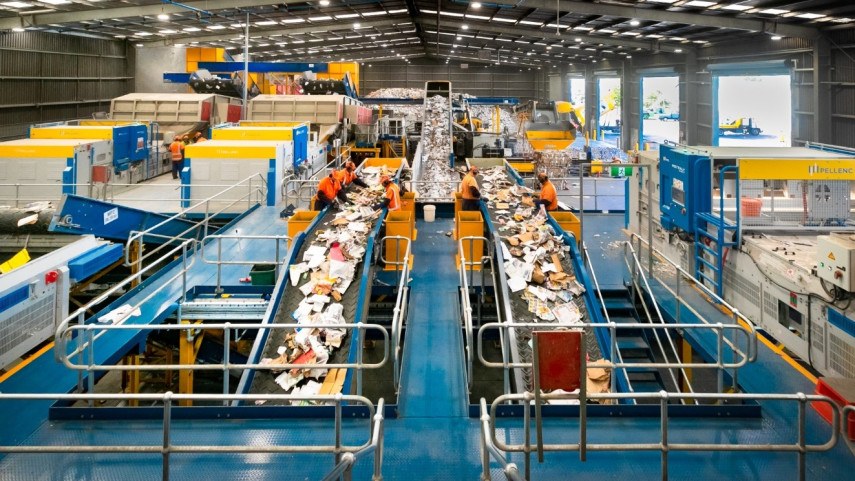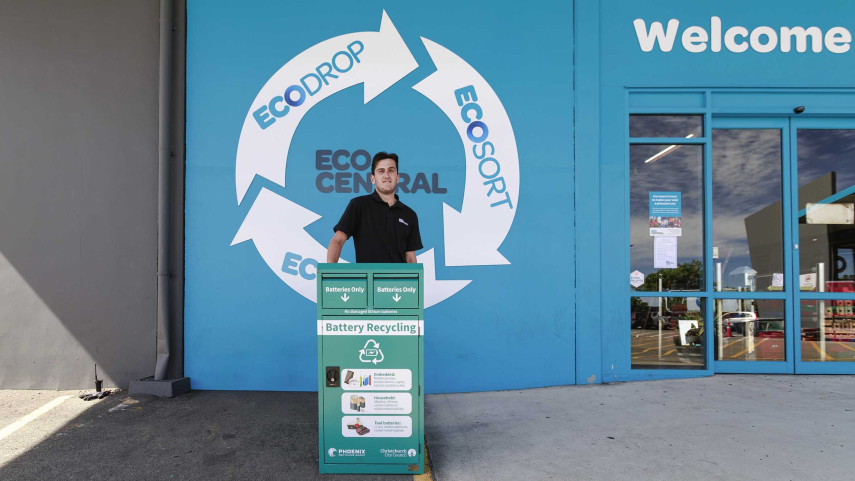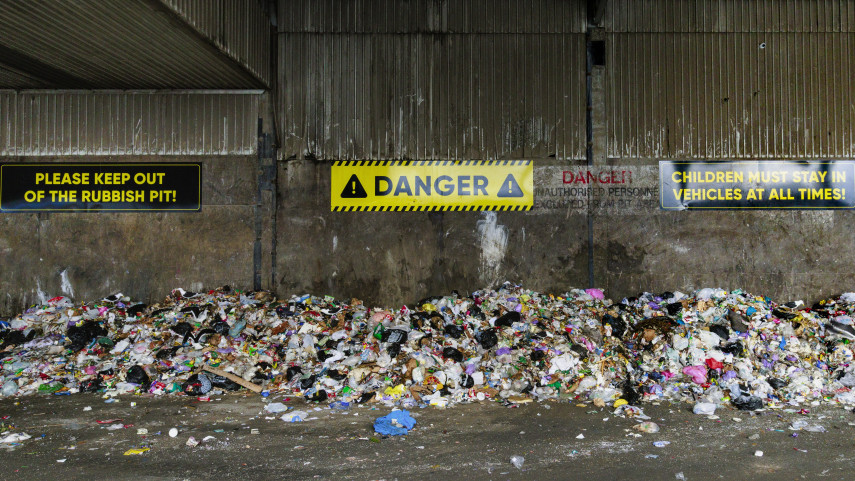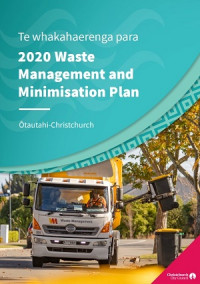Our 2020 Waste Minimisation and Management Plan provides the strategic direction for managing Christchurch’s resource recovery activities for the next six years.
We need to think differently about waste and look for new ways to re-use the things we currently throw away. We all – Central Government, Council, individuals, businesses and the industry – need to do our part to reduce waste and look after the environment for future generations.
The 2020 Waste Management and Minimisation Plan [PDF, 3.8 MB] provides the strategic direction for waste management in Christchurch for the next six years. Our vision is that Ōtautahi-Christchurch is a sustainable city, working towards zero waste and a circular economy.
Achieving the vision
The key methods that we will use to achieve the vision are:
- Supporting and leveraging Central Government’s work programme
- Service delivery review
- Council’s action plan
- Working together
Supporting and leveraging Central Government’s work programme
The Government is investing in resource recovery infrastructure including $16.8 million in funding for EcoCentral to update the optical and mechanical sorting machines used at the Materials Recovery Facility.
Central Government’s work programme on waste has a number of key components, as outlined in Appendix A of the plan. It addresses key issues across the sector including producer responsibility, incentives to reduce waste disposal, national consistency and better value resources.
We are working closely with Central Government and industry to develop the design and implementation of areas within the work programme.
Service delivery review
Section 17A of the Local Government Act outlines the requirements of local authorities to regularly review their services. The review is focused on governance, funding and delivery options that help improve cost effectiveness.In June 2020, the Council decided to carry out a service delivery review of solid waste services. The review is expected to start in October 2020 with final recommendations going to the Finance and Performance Committee.
The challenges facing solid waste services have been identified during the development of this plan and a number of actions required to fulfil the vision can be delivered through the s17A review process including:
- Funding mechanisms designed to support and incentivise waste minimisation
- Review of the current kerbside collection including opportunities for increased flexibility for bin sizes and separated glass collection
- Opportunities to increase the quantity and viable inputs for organics processing
- Expansion of education to schools and organisations
Council's action plan
The detailed action plan is a living document that is updated regularly. Along with the service delivery review, this outlines key activities towards achieving the objectives of Te mahere whakahaerenga para, Waste Management and Minimisation Plan 2020.
The action plan is grouped into five key themes:
- Maximising composting of organics
- Maximising recycling of recyclable materials
- Safe management of hazardous substances
- Leadership and innovation in the Christchurch waste and resource recovery sector
- Effective resource recovery education and communications
Within the themes are 28 actions that have been approved for the current financial year. A summary of each is provided below.
| Action | Description | Status |
|---|---|---|
| 1. | Improve operations at the organics processing plant to accept more products, address processing capacity and odour challenges | Under development |
| 2. | Improve access to Council organics services | Under development |
| 3. | Identify new collection systems for inner-city organics | Under development |
| Action | Description | Status |
|---|---|---|
| 4. |
Work with central Government on developing their waste work programme
|
Ongoing |
| 5. | Identify new collection systems for inner city recycling | Under development |
| 6. |
Support onshore processing of recycling, including solutions for glass, mixed plastic and paper
|
Initiation |
| 7. |
Council work programme to manage contamination (<10%)
|
Expand existing programme |
| Action | Description | Status |
|---|---|---|
| 8. | Promote safe disposal options for hazardous materials
|
Ongoing |
| 9. | Expand the collection and recovery of handheld batteries based on the successful Christchurch pilot
|
Under development |
| 10. | Safely manage all former landfills for ongoing environmental protection
|
Ongoing |
| 11. | Regulate waste operations within Christchurch, utilising the Solid Waste Bylaw 2015
|
Increase focus and coordination |
| 12. | Adopt a regional approach to litter and illegal dumping
|
Expand existing programme |
| Action | Description | Status |
|---|---|---|
| 13. |
Work with industry to promote waste minimisation and resource efficiency across the commercial sector
|
Expand existing programme |
| 14. | Collaborate with Papatipu Rūnanga and organisations, to support a regional transition to zero waste and a circular economy | To initiate |
| 15. | Support for community and environmental organisations through funding schemes and programmes | Expand existing programme |
| 16. | Promote and fund innovation in the waste and resource recovery sector through the Canterbury Waste Joint Committee’s annual contestable waste minimisation fund | Expand existing programme |
| 17. |
Collaborate with CWJC for regional outcomesCollaborate with CWJC for regional outcomes
|
Increase focus and coordination |
| 18. |
Lobby central Government on continued work programme for waste
|
Ongoing |
| 19. | Work with stakeholders to promote a circular economy | To initiate |
| 20. | Service delivery review (Funding mechanisms to support and incentivise waste minimisation and collection models) | Initiation |
| 21. |
Embrace new technology for a better resource recovery system and promote a circular economy
|
Ongoing |
| 22. |
Address Climate Change emissions targets
|
Under development |
| 23. |
Procurement processes that focus on waste reduction
|
Ongoing |
| Action | Description | Status |
|---|---|---|
| 24. |
Increase communication and incentives for keeping waste out of landfill
|
Expand existing programme |
| 25. |
Continuous improvement of behavioural change programmes
|
Expand existing programme |
| 26. |
Provision of school targeted education
|
Expand existing programme |
| 27. |
Provision of education via Council facilities
|
Expand existing programme |
| 28. |
Create a common language around valuing our resources
|
To initiate |
Full detailed action plan [PDF, 38 KB]
Working together
As well as maximising opportunities provided through the Government’s work programme for waste, we need to work with Papatipu Rūnanga, local organisations and other councils to reduce our dependence on international markets for recyclable materials and invest in infrastructure for local solutions. Regional and national collaboration will be essential to minimise waste and achieve our vision for a sustainable Ōtautahi Christchurch, working towards zero waste and a circular economy.
Developing innovative approaches to managing waste is critical to maximising the use of existing resources and developing viable alternatives to landfill. As a local Council, we‘re responsible for managing waste that our communities produce. In addition, we’re able to act as a facilitator, helping the community to:
- Create an environment to more effectively manage resources
- Reduce the waste produced by individual households and organisations
We work closely with other public sector partners and community organisations to develop and support initiatives that support our vision towards zero waste and a circular economy. Some of our partnerships include:
- Central Government
- Papatipu Rūnanga
- Other local authorities and the Canterbury Waste Joint Committee
- Canterbury District Health Board
- Industry representatives, including WasteMINZ, Local Government New Zealand, our contractors, other waste providers and new and emerging technologies
- Research organisations and consultants, including universities, research institutes and sector interest groups
- Community groups and Non-Governmental Organisations
By working together, we can better understand the challenges and opportunities to re-think our current approach to resource use and develop a collective foundation for change.
Further information
Waste management and minimisation Blue Sky Scan ![Blue sky Image not found]()
in 2019, we commissioned Arup to undertake a scenario planning exercise to inform and future-proof this plan. Local and global trends were identified to develop a set of conceptual future scenarios. This led to four possible scenarios, as well as 11 recommendations for us to consider when preparing this plan.
Two key variables were identified:
- Christchurch being integral in driving future change for the region and how collaboratively we work with surrounding councils to allow scalable solutions
- whether business models change to be more circular or not.
This enabled four possible scenarios to be developed to stimulate thinking on where we are potentially heading (see below), as well as eleven high-level recommendations that have been considered as part of the action plan.
High-level recommendations.
1. Create a common language to replace traditional discussions about waste
2. Act as a matchmaker to create a community to share industrial products
3. Continue the education programme but increase the reach
4. As a council, lead by example by going zero waste
5. Review recyclable quantities and evaluate which products should be locally processed
6. Explore synergies between multiple essential services such as wastewater and waste
7. Review opportunities for energy from waste as part of a long-term overall solution
8. Promote and embrace product stewardship schemes
9. Implement procurement policies for single-use plastics and limit imports for problem waste
10. Reduced planned obsolesce and create repair shops and tool libraries
11. Develop data solutions for customer profiling and waste collection analytics
In 2017, we commissioned Just Add Lime to undertake a programme business case. This was aimed at better understanding the disruption and the potential impact on waste and recycling operations, and to explore opportunities that best manage Christchurch’s waste and recycling in the future.
Two problems were identified, which have been recognised and are addressed within this plan:
- Council’s waste and recycling system is fragmented and involves a number of suppliers delivering discrete services, often resulting in duplication, and competing objectives and drivers.
- The fundamental shift occurring in the global waste and recyclable markets, including countries no longer processing global waste and recyclables, increasing market volatility, and increasing customer awareness of waste and recycling practices.
Options were developed to address these problems. The recommended programme utilises waste to energy processes to manage waste and recycling. This is based on three components:
- Recovering energy from the city’s waste and recycling
- Improving operational efficiency and effectiveness
- Developing incentives to encourage waste minimisation
The expected outcomes include reducing the volume of waste and recyclables going to landfill by 70 per cent and applying principles of kaitiakitanga and best practice to sustainably managing the city’s waste and recycling.
Our next steps include deciding whether to proceed with a detailed business case, exploring the financial costs in greater detail as each waste to energy option is considered.
The estimated investment required for the recommended programme is dependent on the type of waste-to-energy process selected for Christchurch. Further, the detailed business case will identify different delivery options; including partnerships with industry, which could be used to manage our financial and risk exposure.
Related news

Gold stars for bin good
Christchurch residents are earning top marks for their best year yet at recycling.
18 Dec 2025
New fire-resistant units for recycling household batteries safely
Christchurch residents have new options for safely disposing of household batteries with upgraded, fire resistant collection units.
16 Dec 2025
Prioritise safety at EcoDrop transfer stations
The Council’s Resource Recovery team and site operator EcoCentral are urging residents to prioritise safety at the EcoDrop transfer stations to protect themselves, their families and staff.
26 Aug 2025
